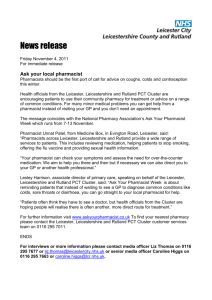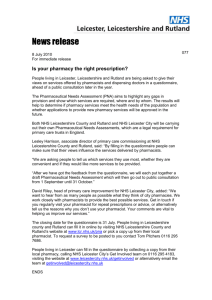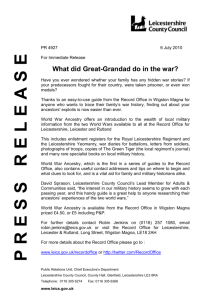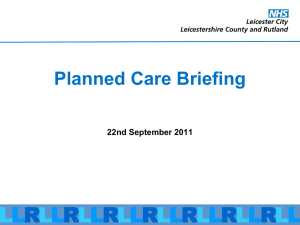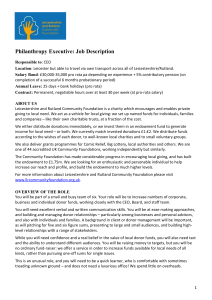Continuing Healthcare – Settings of Care
advertisement
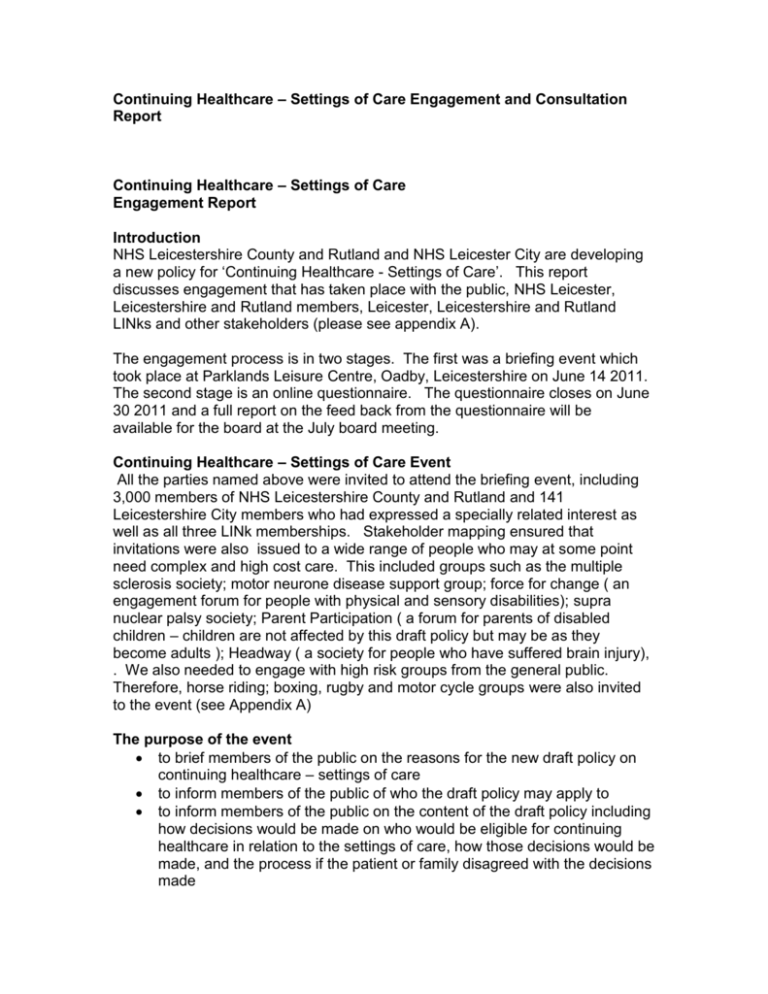
Continuing Healthcare – Settings of Care Engagement and Consultation Report Continuing Healthcare – Settings of Care Engagement Report Introduction NHS Leicestershire County and Rutland and NHS Leicester City are developing a new policy for ‘Continuing Healthcare - Settings of Care’. This report discusses engagement that has taken place with the public, NHS Leicester, Leicestershire and Rutland members, Leicester, Leicestershire and Rutland LINks and other stakeholders (please see appendix A). The engagement process is in two stages. The first was a briefing event which took place at Parklands Leisure Centre, Oadby, Leicestershire on June 14 2011. The second stage is an online questionnaire. The questionnaire closes on June 30 2011 and a full report on the feed back from the questionnaire will be available for the board at the July board meeting. Continuing Healthcare – Settings of Care Event All the parties named above were invited to attend the briefing event, including 3,000 members of NHS Leicestershire County and Rutland and 141 Leicestershire City members who had expressed a specially related interest as well as all three LINk memberships. Stakeholder mapping ensured that invitations were also issued to a wide range of people who may at some point need complex and high cost care. This included groups such as the multiple sclerosis society; motor neurone disease support group; force for change ( an engagement forum for people with physical and sensory disabilities); supra nuclear palsy society; Parent Participation ( a forum for parents of disabled children – children are not affected by this draft policy but may be as they become adults ); Headway ( a society for people who have suffered brain injury), . We also needed to engage with high risk groups from the general public. Therefore, horse riding; boxing, rugby and motor cycle groups were also invited to the event (see Appendix A) The purpose of the event to brief members of the public on the reasons for the new draft policy on continuing healthcare – settings of care to inform members of the public of who the draft policy may apply to to inform members of the public on the content of the draft policy including how decisions would be made on who would be eligible for continuing healthcare in relation to the settings of care, how those decisions would be made, and the process if the patient or family disagreed with the decisions made to gain feed back from the public on the draft policy The event was chaired by Pauline Tagg Non Executive Director NHS Leicestershire County and Rutland. Speakers included: o Donna Enoux, Assistant Director of Finance - Commissioning NHS Leicestershire County and Rutland, who gave a financial overview o Dr Mike McHugh, Consultant in Public Health, who gave a clinical perspective on who may need complex and high cost care o Jim Bosworth, Assistant Director NHS Leicester City, who gave a summary of the draft policy and what it would mean for patients. The presentations were followed by a question and answer session where members of the audience put their questions to a panel of experts. The panel was made up of the presenters along with Ruth Johnson, Head of Continuing Health Care, NHS Leicestershire County and Rutland and Gill Brigden, Non Executive Director, NHS Leicester City. Questions included: Q What is different with this policy than what you have been doing before? A The panel and assessments process would remain the same. However, currently we don’t have a financial framework to apply the individual’s circumstances to. This policy will give a framework to the decision making process. For example, one of the criteria to be considered will be if the preferred setting of care is going to cost more than 25% of the recommended setting of care where quality, safety and effectiveness of care are equal. The policy sets out that the more cost effective option should be taken. Q What is the PCT hoping to save? A Over the past two years costs for settings of care have increased by 30%. This pattern of growth in demand is unsustainable. Therefore, the draft policy should help to manage demand in a sustainable manner. Q You have talked about a multi disciplinary tool as part of the assessment process used to identify the need for referral to the complex and high cost care panel. What expertise would be sought when decisions were made for someone with cystic fibrosis? A The tool would always be completed by the patient, the patient’s specialist and members of the multi disciplinary team caring for the patient. In this way all of the patient’s needs would be taken into account when the tool is completed. If the panel feel they need any further information then further information and support would be sought from a specialist. Q Once assessed and a decision made is there a process for a regular review? A Yes there is initially a review at 3 months and then annually. Q How do you make sure that information at the source is accurate? A When relying on someone else completing the form, if the evidence doesn’t support the scoring then we will go back and ask for more information. If the patient or family disagrees with the information given we will also go back to make sure the information is accurate. The assessment tool is as water tight as it can be but it is very important that the whole team involved in the care of the patient is involved and the patient’s family with its completion. Q How can we be reassured that nursing homes have the staff to meet the needs of people with complex care and high cost needs? A It is planned that the contracts with the Primary Care Trust and the nursing home will have specifications to commission the specialist services to meet the needs of patients with complex and high cost care. Q How do you deal with the postcode lottery? A We are looking today at setting policy locally. By having the financial framework in place we can provide consistency across Leicester, Leicestershire and Rutland. Therefore, this policy is relevant to Leicester, Leicestershire and Rutland but may differ elsewhere. Q. What are the numbers of patients receiving continuing care for 09/10? A. 1,200 to 1,300 patients at any one time are receiving continuing care. We don’t have actual figures to hand. Q. Have you looked at cost of care in the home vs. nursing home etc? A Yes on an individual case basis we have done and continue to do this. Q. Can a patients care package change? Can care and support be removed once it has been granted? A. Yes. Patients are reviewed annually and their care package could change according to their individual needs. Q. Will the policy be affected by the reforms of the NHS? A. No. There are no indications of this whatsoever. Q. Please explain a little more on the decision support questionnaire? A. If someone isn’t eligible for funding then a relative may appeal on their behalf. There are two layers to the panel that approves this. A triage panel and a multiagency panel. The panels try and make cases and decisions for these cases as independent as possible. Q. If there are three people with complex care needs in a family, will their care be assessed individually or as a family? A. These will be assessed individually but the assessors will take into account the family dynamics, this way you meet individual’s needs. Q. What are the key risks and benefits? A. The main benefit will include increased consistency in the process and it will allow us to find appropriate and affordable answers. Of course there will be some risks; some packages won’t be available and we need to find smarter ways to provide care at lower cost. Q. Will the PCT still pay for specialist care out of county? A. This will be based on individual needs. No plans have been finalised. We want to ensure a greater range of services are available across Leicester, Leicestershire and Rutland. We need to balance the needs of patients Comments on questions asked During the question and answer session no one in the audience indicated specific issues around the content of the policy or asked for any specific changes or amends to the draft policy to be considered. Most of the questions asked relayed concerns around eligibility for continuing care rather than concerns around the content of the policy. Feedback from the Continuing Healthcare – Settings of Care Questionnaire 17 questionnaires were completed at the event Everybody understood the need for the policy and agreed there was a need for the policy. Out of 17 responses, only one person felt that ethical and moral needs were not stated, but did not comment why not. The majority of people agreed with the process of the assessment, some people did not know and 2 people disagreed. The same number of the public agreed and didn’t know if the policy was both a fair use of funding and maintained high quality care options, two people disagreed. General comments included: Who will carry out the patient assessment? Which groups of professionals make the decisions and will this be reviewed at intervals? It happens that the panel who tried to answer questions today are somewhat unclear about the policy. Families should be able to choose to 'top up' if they made provision in their life time to be able to do so. A crisis often occurs around discharge from hospital. Some care/nursing houses do not link up to acceptable standards Concern about the future of the NHS and if things will change if pct's are abolished in favour of other means of procurement. One person was confused stating: Policy vs. High quality One person wanted to highlight: High cost complex care referral panel There needs to be some method of ensuring quality for patients Demographics of the feedback (not all people filled in answers to these questions) Of those competing the survey 8 were female and 5 male. There were 6 members aged 35-39, 4 members aged 76+, one under 35 and 3 aged 60-75. Most people were White British, or European, 2 Asian Indian, one black Caribbean and some preferred not to say. There were only two people with a disability, some preferred not to say. All those completing the questionnaire stated they were heterosexual or preferred not to say. A mixture of Christian, no religion, Hindu and a couple preferred not to say. From Leicester City 9 people completed the questionnaire and 4 people from the County. Conclusion The questionnaires completed at the event provide a snapshot of the feed back we may receive once the online questionnaire has run its course and reflects many of the concerns raised by the audience during the question and answer session. This appears to suggest general agreement with the draft policy. One comment suggests that patients are allowed to ‘top up’ if there is a discrepancy in the cost of care and what the PCT will pay for. Otherwise concerns were around eligibility rather than the policy itself. A few members of the audience commented that the questionnaires would have been easier to fill in if they had the full information or full policy to guide their decision on how much they agree with the policy and whether there are ethical problems, assessment problems or if it is fair. A summary of the policy was provided with the questionnaire. Members of the audience were invited to request a hard copy of the policy and fill the questionnaire online rather than at the event. Following the event there have been two requests for hard copies of the draft policy.
